As an essential source of revenue structure of urban local bodies (ULBs) across the country, this study takes a look at property tax. Haryana property tax assessment is one of the largest sources of revenue for the local government through which it is in a position to provide basic services such as water supply and sewerage systems, road repairs, and construction, among other amenities.
The aim of this paper is to provide comprehensive information to the property owners of Haryana about property tax and its assessment and calculation as well as how it can be paid without violating the laws.
To accomplish this goal, this blog post will give you a pretty good idea about the Haryana property tax structure, how it is calculated, what kind of exemptions are available, how to submit the payment, and the legal consequences of non-payment.
- What is the Introduction to Haryana Property Tax?
- What is the Governing Bodies and Framework of Haryana Property Tax?
- Which Type of Properties Liable for Taxation in Haryana?
- What are the Benefits of Haryana Property Tax?
- How to Calculate the Haryana Property Tax?
- What is the Haryana Property Tax Bill?
- How To Pay Haryana Property Tax Payment?
- What is the Due Date of the Haryana Property Tax?
- How to Change Name in Haryana Property Tax?
- How to Search the Haryana Property Tax by Name?
- What is the Age factor in Haryana Property Tax?
- What are the Tax Rate sand Slabs of Haryana Property Tax?
- What is the Haryana Zone List?
- What are the Exemptions and Concessions on Haryana Property Tax?
- What will be the Property Tax in Urban Local Bodies (Municipalities and Municipal Corporations) in Haryana?
- What is the Haryana Property Tax Rebates Schemes?
- What are the Haryana Property Tax Reforms and Digitalization?
- In Conclusion
- FAQs
- 1. Can I pay my property tax in installments?
- 2. How can I check my property tax dues?
- 3. What happens if I fail to pay my property tax on time?
- 4. Can I claim any deduction on property tax paid in my income tax returns?
- 5. What is the process for correcting errors in property tax records?
- 6. Are vacant properties subject to property tax in Haryana?
- 7. What documents are required for property tax payment in Haryana?
- 8. Is there any grace period for paying overdue property tax without penalty?
- 9. Can non-resident property owners pay property tax online?
What is the Introduction to Haryana Property Tax?

Property tax is an instrument of direct taxation under which the local government levies a fixed amount every year from property owners. The basis of calculation of property tax depends on the amount and nature of the property which can be residential or commercial property.
It is also important to understand that this tax is part of the total revenue of the government which aids local governments in the development of infrastructure, provision of civic utilities, and maintenance of public amenities.
In the case of Haryana, property tax is levied on residential, commercial, industrial, and vacant land classifications and its imposition lies with urban local self-governing bodies like Nagar Palikas/Nagar Nigam.
What is the Governing Bodies and Framework of Haryana Property Tax?
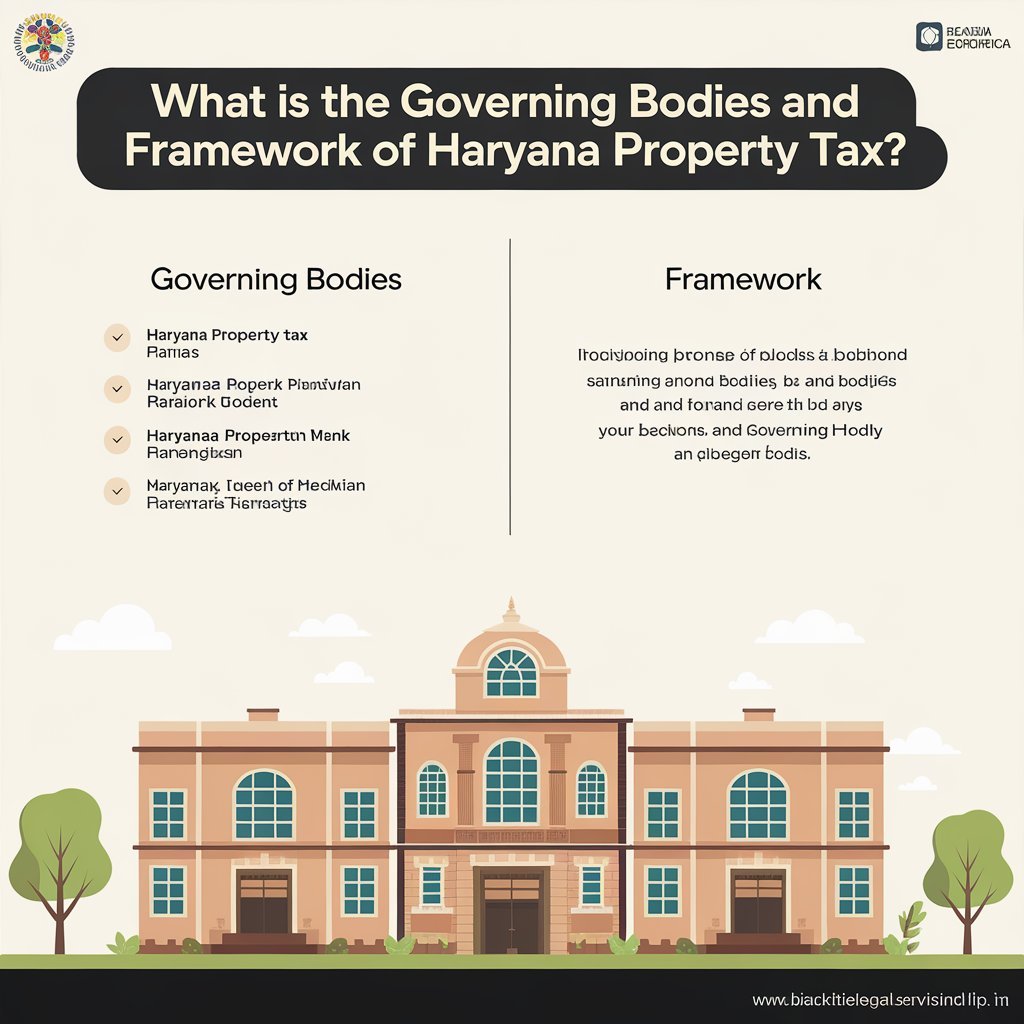
The assessment and administration of Haryana property tax are primarily in the hands of urban local bodies such as Municipal Corporations, Municipal Councils, and Municipal Committees.
The legal provisions relating to the levy and collection of property tax can be found in the Haryana Municipal Corporation Act, 1994, and the Haryana Property Tax Act, 1973. These Acts enable local governing bodies to assess and collect revenue in the form of taxes on properties within their area.
The collection of property tax of ULBs in the Haryana region, overall administration, and policy reforms fall under the discretion of the Directorate of Urban Local Bodies.
ULBs in various cities including Gurugram (Gurgaon), Faridabad, Panipat, Karnal, and others are involved in the process of assessment and determination of each property tax structure as per the nature and use of the respective property.
Which Type of Properties Liable for Taxation in Haryana?
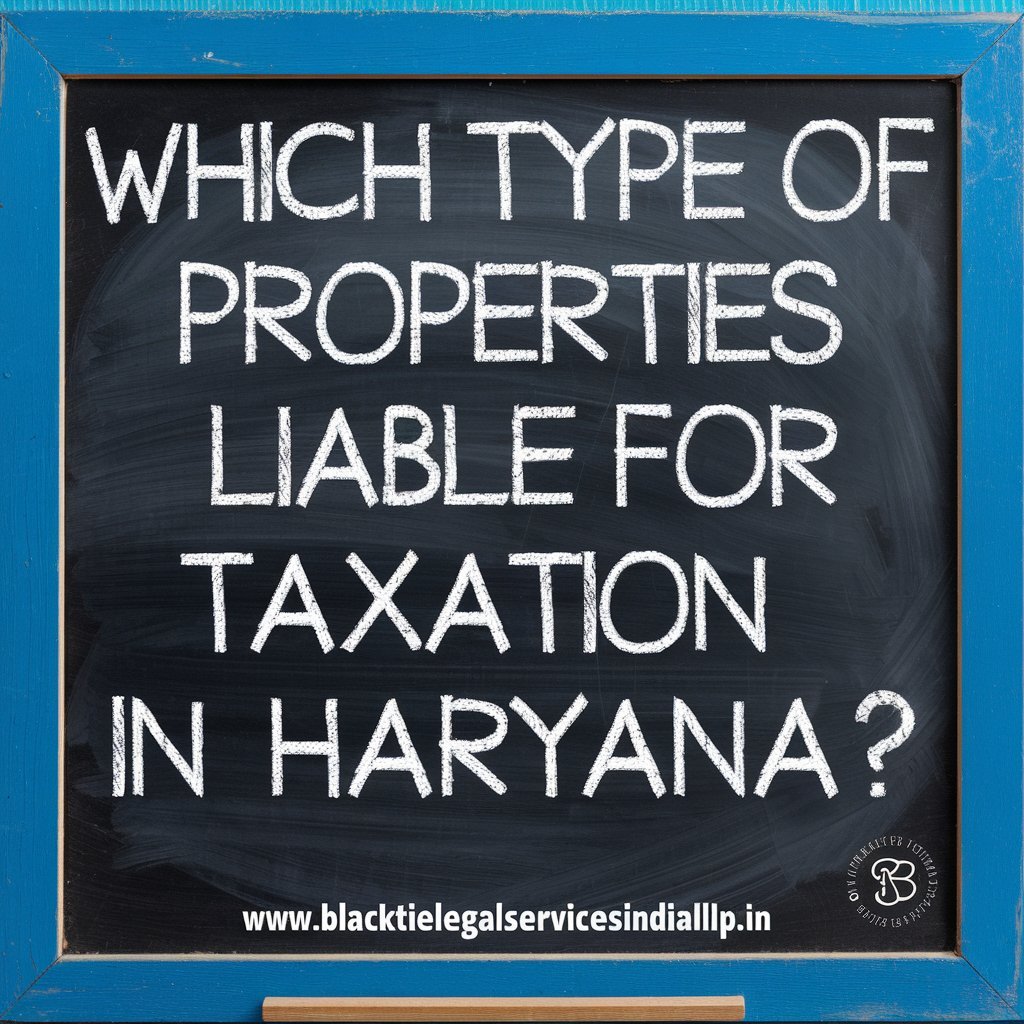
Property tax is levied on various categories of properties in Haryana, including:
- Residential properties: Flats, apartments, independent houses, and bungalows.
- Commercial properties: Shops, offices, malls, and shopping complexes.
- Industrial properties: Factories and manufacturing units.
- Institutional properties: Hospitals, educational institutions, and other similar entities.
- Vacant land: Properties that are undeveloped or unconstructed.
It is important to note that the tax rates and assessment methods differ based on the type and usage of the property.
What are the Benefits of Haryana Property Tax?

If property owners pay Haryana property tax, they will get a lot of benefits and this will help in the development and infrastructure of urban and rural areas. Here are the main benefits:
- Improved Civic Infrastructure: The amount collected from properties and property taxes is used in the construction and maintenance of public works including the construction of roads, street lamps, parks, drainage systems, and other social amenities to enhance the living standards of the people.
- Provision of Essential Services: From property taxes, municipal authorities are in a position to fulfill some of the major utilities like water, waste collection, sewage disposal, and cleaning. Maintenance is another factor that is paid regularly as the services are improved and well maintained.
- Legal Proof of Property Ownership: The legal aspect of paying property tax on time is that it serves as a receipt for the property, thus acting as proof of ownership. It helps eliminate the chances of disagreements regarding the ownership of the property and also provides legal support in case of any legal matters related to the property.
- Development of Public Amenities: Property tax also helps in setting up of other public amenities including community halls, libraries, schools, hospitals, and playgrounds, thereby improving the standard of the community.
- Eligibility for Government Schemes: It has been shown that consistent payment of property tax gives property owners access to various government-sponsored programs, subsidies, and incentives. Some examples could be in areas such as housing, health, and any other welfare project.
- Discounts and Rebates: Some of the common incentives offered by municipalities in Haryana Property Tax include concessions in the form of reduction in property tax rates, for early recovery or on any other grounds such as senior citizens. This helps the organization save some cash and also ensures that all bills are paid on time.
- Support for Urban Planning and Development: The funds received are used for practical planning – in capacity, space, and social structure – such as slum renovation, traffic control, and environmental considerations that make cities and towns efficient and organized.
- Emergency and Disaster Management: Property tax is used to finance certain emergency services, such as fire departments, disaster management, emergency response units, etc., and this means better preparedness to deal with any potential disaster.
How to Calculate the Haryana Property Tax?
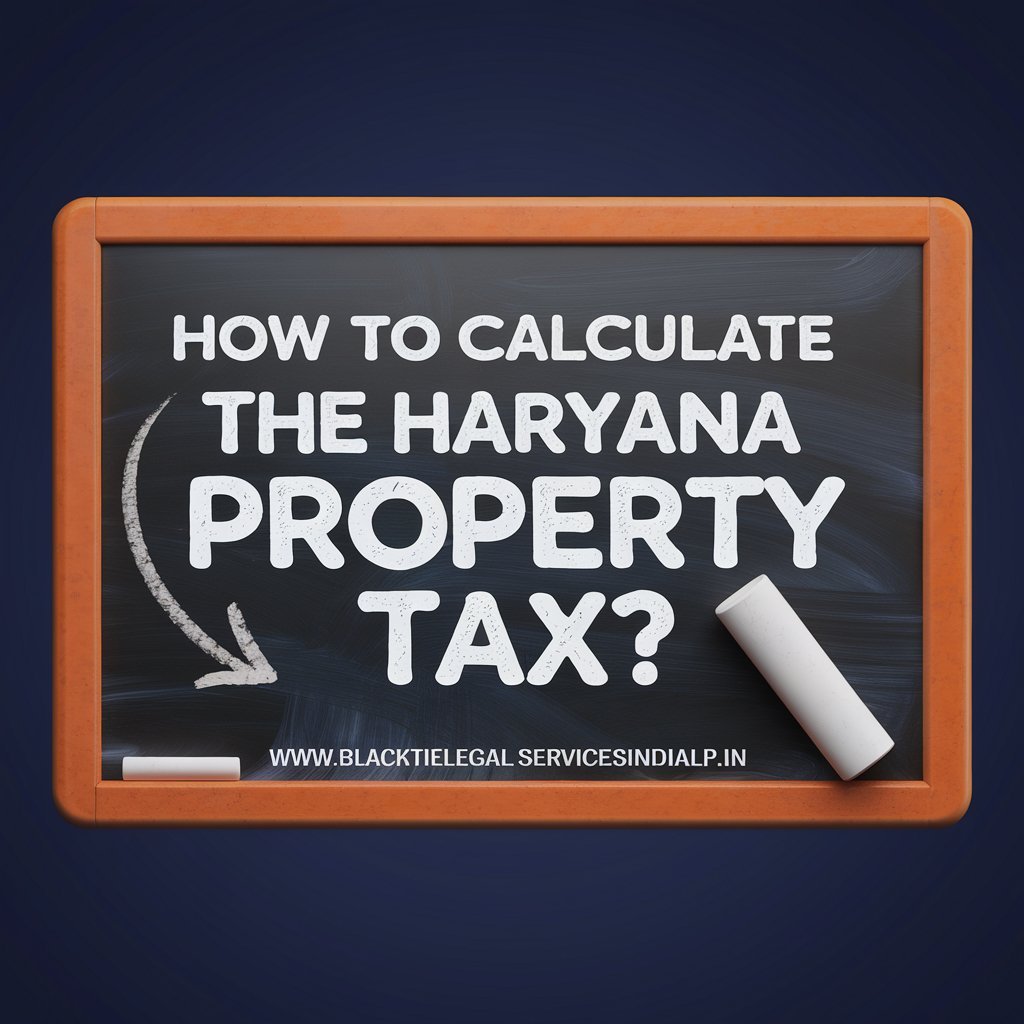
To understand Haryana property tax, the following steps are followed while calculating the tax payable. Haryana Property Tax depends on the type of property, its use and location, and the size of the property. Here is a simplified step-by-step guide to calculate it:
Identify the Property Type:
- Residential: Owned or rented for living and use.
- Commercial: Shops, offices, etc.
- Vacant land: Partially or fully, all of these fall into the unused or under-construction category.
Determine the Area and Rate:
- Property tax is calculated as a proportion of the size of the property which is usually measured in square yards or square metres.
- Some of the factors include the location of the property whether it is located in an urban area or rural area, usage whether it is residential or commercial, and the size.
Find the Base Rate:
- The base rate is determined by the local municipal corporation at the initial stage and may vary in some cities or towns of Haryana.
- It may be some other amount in case of residential use as compared to the property with commercial use.
Calculate the Annual Value:
- Annual Value = Total Area of the Property × Rate per Square Yard/Foot/Metre (as applicable).
Apply the Property Tax Rate:
- The property tax rate is generally expressed as a ratio of annual value. This rate is declared by the local municipal corporation in their respective areas.
- Property Tax = Annual Value × Property Tax Rate.
Additional Charges:
- It is sometimes also possible to pay additional fees, such as a cleaning fee or water rate.
Deductions (if applicable):
Some municipal corporations allow deduction based on categories like senior citizens, women, ex-servicemen, etc.
Example Calculation:
- Property Type: Residential
- Location: Urban Area
- Total Area: 200 square yards
- Rate per square yard: ₹10
- Property Tax Rate: 5%
- Annual Value = 200 sq. yards × ₹10 = ₹2000
- Property Tax = ₹2000 × 5% = ₹100
So, the property tax would be ₹100 annually.
What is the Haryana Property Tax Bill?

The Haryana property tax bill is prepared by the municipal authorities of the respective property and it shows the amount of tax that is to be paid by the property owner for that financial year.
Key Points of the Haryana Property Tax Bill:
- Property Details: It is necessary to include at least four fields to include property identification data: property ID, owner name, address, and type.
- Tax calculation: i.e. with the typical annual rental value (ARV) or unit area value (UAV) as the basis for calculating the tax.
- Additional charges: This may include water, sewerage, and sanitation charges.
- Discounts and concessions: Information about any special discounts that may be effective if payments are made on a regular basis.
- Total amount payable: For final payment, this calculates the amount to be paid and the date of payment.
- Payment methods: E-commerce transaction modes and offline payment methods including instructions.
- Unique bill number: An identification number as well as a tracking and payment number.
- Citizen services: It must be paid before due dates to avoid penalties that will be levied in case of non-payment of due civic services.
How To Pay Haryana Property Tax Payment?

Here’s how you can pay Haryana property tax both online and offline:
How to Pay Haryana Property Tax Online
- Visit the official website: Find some information on the main page of the respective municipal website like Gurgaon MCG, Faridabad MCF, or any other municipal website of the state of Haryana.
- Go to the property tax section: On most sites, this will be located under “Property Tax” or “Online Services” on the home page.
- Enter property details: Tax information can be accessed by entering values like property ID, owner name, or bill number.
- View tax details: View a summary of property taxes including information like the amount payable, additional amounts or charges, and appropriate discounts offered.
- Choose payment method: Choose the payment mode using net banking, debit/credit card, or digital wallet.
- Complete the payment: The customer has to enter the payment details and then confirm the payment. As always, remember to keep or capture proof of payment in receipt format.
How to Pay Haryana Property Tax Offline
- Visit the local Municipal Corporation office: The first thing to do is to visit your nearest Municipal Corporation or Council where you live.
- Get the property tax challan form: Generally, it can be obtained from the office or else from the official website and fill in the relevant parts.
- Fill in the details: Fill in the property details such as property ID, owner name, and other required details.
- Submit the form and make payment: After completing the above steps you have to attach the required documents with the filled form and make the payment which can be in the form of cash, cheque, or DD deposit over the counter.
- Get the payment receipt: If you make the payment you will be given a receipt from the Municipal Corporation office to show that you have made the payment. Please, you can keep this receipt with you.
Thus, you can easily pay your Haryana property tax online or offline and take care not to cross the deadline and not incur penal charges as a result.
What is the Due Date of the Haryana Property Tax?

The last date for payment of Haryana Property Tax is considered to be March 31 of the financial year. This is the last date for payment of property tax for the entire financial year and non-meeting of this deadline attracts fines or penalties on property owners.
Important Points to Note:
- Discounts for early payment: Not all municipal corporations in Haryana Property Tax may provide any discounts or rebates for early payment of property tax. For discounts, always ask your local municipal authority if any discounts are available for your scheme.
- Penalties for late payment: If the property tax is not paid as agreed, interest or penalty may be charged. Therefore, it is advisable to pay the tax on time to avoid those charges.
- Notifications: Municipal corporations may also use mail or SMS and or email on mobile phones to remind property owners of the due date.
One should refer to the official website of the specific municipal corporation or contact the local municipal bureau to get the most current and detailed data on due dates.
How to Change Name in Haryana Property Tax?

To change the name on a Haryana Property Tax record , you need to follow a formal procedure through the local municipal corporation or council. Here is a step-by-step guide:
Steps to Change Name in Haryana Property Tax Records
Get the application form: Visit the official website of the concerned Municipal Corporation (e.g. Gurgaon Municipal Corporation, Faridabad Municipal Corporation, etc.), or visit the Municipal Center of the concerned corporation to get the “Name Change Application Form” for property tax.
Fill out the application form: This form should contain the details of the current name of the property owner, property identification number, current address of the property, and the new name that is to be changed.
Attach all the Documents:
- Proof of property ownership: Sale deed, gift deed, or any other document that proves the title of the owner of the property.
- Latest property tax receipt: A copy of the latest proof of the property owner paying his property tax.
- Identity proof of the new owner: Document proof of the new owner for identification (Aadhar card, voter ID card, passport, etc.) should be submitted in a photocopy.
- No objection certificate (NOC): If applicable:- NOC from the previous owner.
- Mutation deed or affidavit: Mutation deed or affidavit in support of change in ownership or name.
Submit Application: After filling in all the details in the prescribed application form, attach all the required supporting documents and submit them to the local Municipal Corporation/Council office.
Pay Processing Fee: Apart from the notice and publication, the required fee for the name change application also needs to be paid. Also, the fee amount may vary, so please contact the Municipal Corporation office for the fee details.
Verification Process: The Municipal Corporation officials will conduct the necessary checks on the documents provided. This may include a site visit to the property for the purpose of confirming everything.
Get Confirmation: In case of confirmation, the Municipal Corporation will change the name in the property tax database. You will get an acknowledgment letter or revised property tax details containing the new name.
Check Status Online: Also check the status of your name change request on the official website using the property details.
Important Points:
- Make sure all the papers are certified and valid.
- The new name may take time to process, in which case you will have to go back to the Municipal Corporation office to ask why the process is taking so long.
So by following the procedure mentioned above you can easily modify the name on property tax records in Haryana.
How to Search the Haryana Property Tax by Name?

To search for Haryana Property Tax details by name in Haryana, follow these steps:
- Visit the official municipal corporation website: Visit the official page of the particular municipal corporation of a city in Haryana, for example, Gurgaon, Faridabad, or any other relevant city.
- Go to the property tax section: Search for the phrase “property tax” or “search property tax” in the section of the website designated for online services.
- Select the Search by Name option: Select the search type by owner’s name to get property tax information.
- Enter property owner details: Under personal information, enter the property owner’s full name or ward number or any details that are mandatory to narrow down the search.
- View property tax details: The website will also show property tax information such as the amount of tax that has not been paid, and tax payment records apart from other information.
- Download or print: It is easy to download or print any tax details for future reference or to make any payment.
What is the Age factor in Haryana Property Tax?

The age factor in Haryana property tax can also be understood in terms of discounts that are given based on the age of the person or the property. Here is how it works:
Senior citizen concession: Homeowners who are individuals (usually at least 60 years of age) will get some discount on property tax. This concession is aimed at reducing the cost for elderly people living in the area.
Rate of discount: The exact percentage of discount varies from one municipal corporation to another. It is often a percentage of the entire property tax amount, and it may vary from one city to another.
Conditions for Availing Age Factor Rebate:
- The property must be registered in the senior citizen’s own name.
- I was also happy to see that they were required to provide proof of age and identity to be able to qualify for the discount.
- A property that is not related to any commercial enterprise or industrial complex must satisfy the usage factor relating to residence.
Rebates on old properties: Sometimes properties may have some depreciation factor applicable to them, which may reduce the amount of taxable value.
What are the Tax Rate sand Slabs of Haryana Property Tax?

The Haryana Property Tax rates vary based on the type of property (residential, commercial, industrial, etc.) and its location (zones). Below is a table summarizing the current tax rates and slabs for Haryana property tax:
| Property Type | Annual Rental Value (ARV) or Unit Area Value (UAV) Slabs | Tax Rate |
|---|---|---|
| Residential | Up to ₹20,000 | 5% |
| ₹20,001 – ₹50,000 | 7.5% | |
| Above ₹50,000 | 10% | |
| Commercial | Up to ₹50,000 | 12% |
| ₹50,001 – ₹1,00,000 | 15% | |
| Above ₹1,00,000 | 18% | |
| Industrial | Up to ₹1,00,000 | 15% |
| ₹1,00,001 – ₹5,00,000 | 18% | |
| Above ₹5,00,000 | 20% | |
| Institutional | Up to ₹30,000 | 8% |
| ₹30,001 – ₹75,000 | 10% | |
| Above ₹75,000 | 12% |
What is the Haryana Zone List?

For the purpose of property tax assessment, the state of Haryana is divided into various zones. It has been clarified that different charges may be levied in each zone depending on the location, development and openness of the respective area. Below is a typical zone list used in Gurgaon, Faridabad and other Haryana Property Tax cities:
| Zone | Description |
|---|---|
| Zone A | First choice areas for investment which include prime business districts, major market places and well-established residential areas. Higher taxation is done here. |
| Zone B | Pleasant housing and business districts, moderately developed retail shops and commercial establishments such as medium-end supermarkets and small businesses. Moderate tax rates apply. |
| Zone C | High-rise houses, newly built or less built-up residential areas, smaller or less accessible markets. Lower taxes than Zones A and B. |
| Zone D | Areas within municipal limits that are characterised by low population density and low functional complexity and hence have lower property taxes. |
Such zones help municipalities to fix property tax rates for properties based on their area and accessibility.
What are the Exemptions and Concessions on Haryana Property Tax?

The Haryana government provides various exemptions and concessions on Haryana Property Tax for certain categories of property owners, including:
- Senior Citizens: When it comes to paying taxes for self-occupied property, tax exemptions are available for senior citizens.
- Women: Co-owners who are women should know that as per the local body rules, they may be eligible for exemptions in residential property taxation.
- War Widows and Disabled Persons: Each local body has its own policies regarding regulation, including some exceptions for war widows and disabled persons.
- Agricultural Land: It is important to note that most lands used in agricultural practices, including farms, are not subject to property tax.
What will be the Property Tax in Urban Local Bodies (Municipalities and Municipal Corporations) in Haryana?

Gurgaon Property Tax
Gurgaon, popularly known as Gurugram, is one of the largest and economically most important cities in Haryana. The Municipal Corporation of Gurugram (MCG) is the local government body directly responsible for the process of property tax in the area.
Real estate in Gurgaon is a very active market and property tax is based on the location also called zone in Gurgaon, type of property, and usage type. Commercial properties in areas such as Cyber City attract higher taxes than residential properties located in suburban areas.
Faridabad Property Tax
The Municipal Corporation of Faridabad (MCF) is responsible for overseeing the property tax system in the city of Faridabad. This is done through the Unit Area Method which considers certain parameters such as the age of the building, use of the building, and the location of the building.
Also, it can be observed that the property tax rates in Faridabad are inclined towards being an industrial and commercial city, where commercial properties are charged higher than residential properties.
Other Cities
Similarly, the tax rates and structure of Haryana Property Tax are implemented in other cities like Panipat, Karnal, Rohtak, Ambala, and Hisar through their municipal corporations.
The principles of the Unit Area System are uniform and clear, but the individual ratings and policies of each local body of the city may vary due to local requirements and problems of economic conditions.
What is the Haryana Property Tax Rebates Schemes?
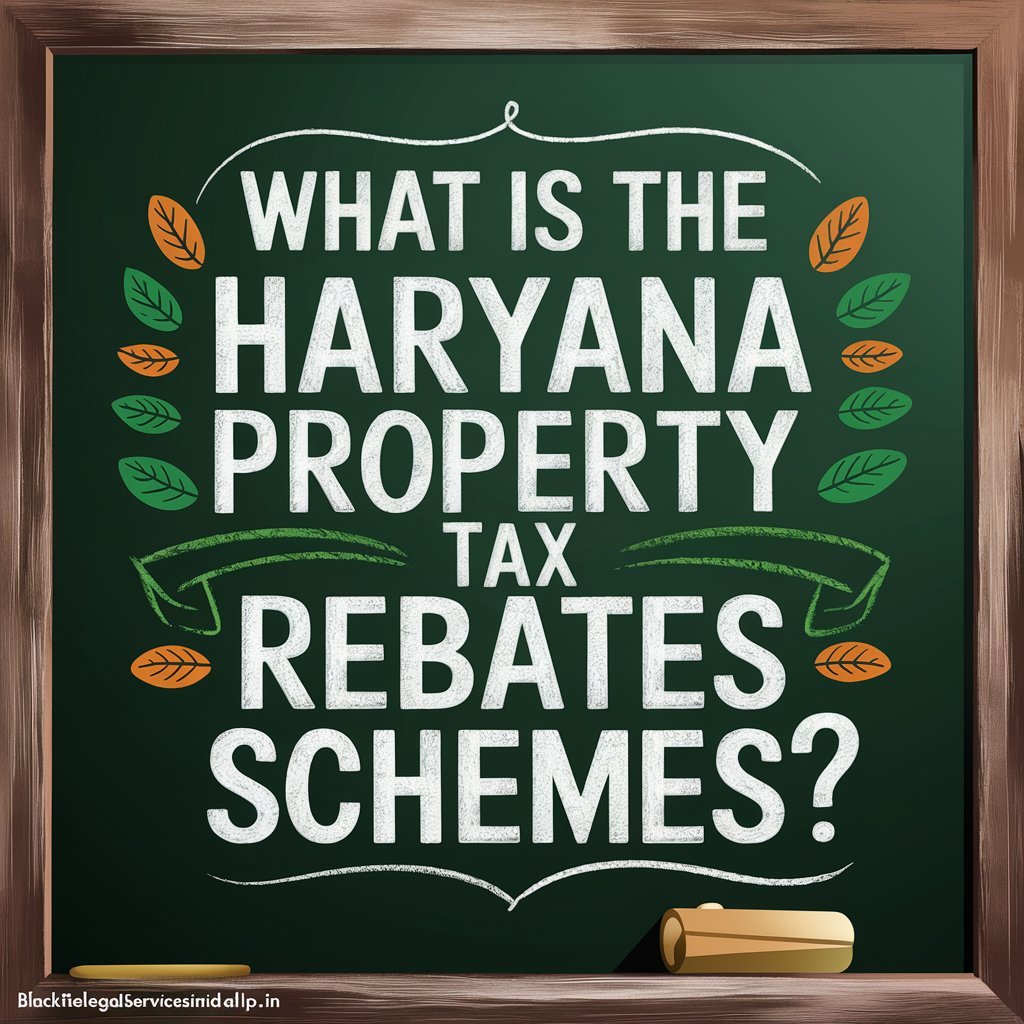
In Haryana, municipal bodies use discount options to motivate customers to pay Haryana Property Tax on time. Some of these discounts include:
- Early payment discount: Jumbo property taxpayers who pay their taxes before a particular time, such as the first quarter of the financial year, can usually get a discount or concession of around 5% to 10%.
- Full payment rebates: Some cities offer discounts for paying property taxes in one go throughout the year compared to paying them in parts.
- Concession for green buildings: Homes and properties that use green energy like electricity from solar panels, rainwater harvesting, and energy-efficient homes will be eligible for special discounts. As a result, property owners are motivated to make their contribution towards environmental sustainability and enjoy lower taxation charges as well.
What are the Haryana Property Tax Reforms and Digitalization?
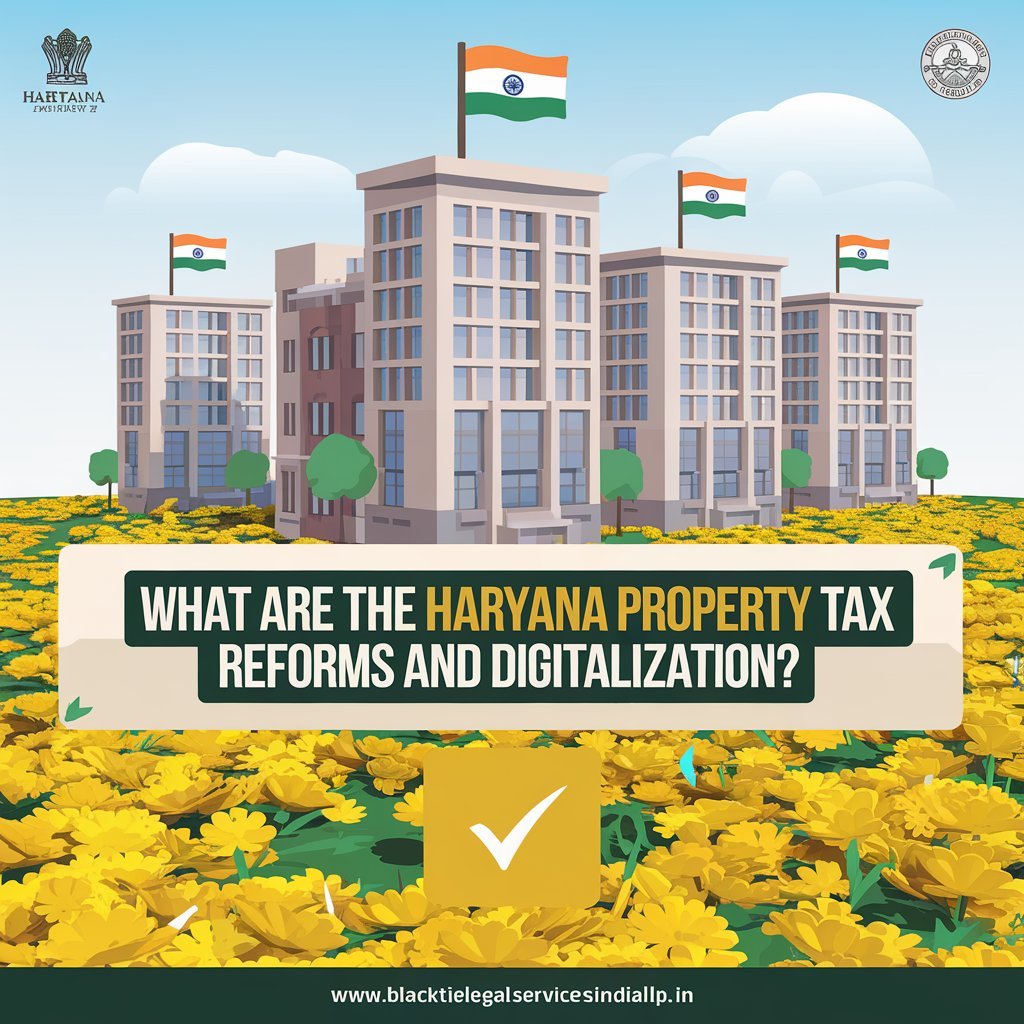
Recently, the Haryana government has made several changes in the structure of Haryana Property Tax, in order to increase its effectiveness and level of transparency. The major reforms include:
- Introduction of GIS-based property mapping system: This system makes it easier to identify and classify properties, thereby reducing incidences of tax evasion.
- Online payment platform: To ensure that most payments are made on time and there is no hassle in paperwork, the government has created online portals.
- Self-assessment mechanism: This has resulted in benefits such that property owners can now assess their property tax liability on the Internet through the parameters and tax slabs prescribed by the government.
These reforms are aimed at making tax collection more organized and citizen-friendly, as well as increasing the overall revenue base of local bodies.
In Conclusion

It is worth noting that in Haryana property tax is a crucial part of the urban governance and budget system. How its valuation is calculated, what are the rates and the payment procedures are of utmost importance to all real estate owners so that they can avoid all kinds of hassles.
This is an ongoing process, however, the rational state government has ensured that the process is digitized, thus making it easier and accessible to more citizens. The more residents comply with the property tax provisions, the more they directly participate in the improvement of their neighborhood.
Lastly, we hope that you all read this Haryana property tax blog post, you will not face any kind of complexity from time to time and also you will get a lot of good information about all the aspects that have been explained in this blog post.
FAQs
1. Can I pay my property tax in installments?
A1. Some local municipal bodies located in Haryana may offer flexibility in the form of levying property tax in partial installments. Still, this depends on the specific policies present in each urban local body. As for the price, it would be wise to consult your municipal corporation about the possibility of installments.
2. How can I check my property tax dues?
A2. You can visit the official website of your local municipal corporation or the Directorate of Urban Local Bodies (Haryana) to check your property tax dues. To get your token, you will need to enter some specific information like your property ID or the name of the property owner or the location of the property.
3. What happens if I fail to pay my property tax on time?
A3. This means that if you do not pay the property tax on time you may be charged a penalty and interest or you may even be taken to court. The penalty amount usually increases with even more delays and sometimes the concerned local authority may resort to sealing the property.
4. Can I claim any deduction on property tax paid in my income tax returns?
A4. No tax deduction is allowed on fees paid to professionals such as advocates, architects, etc. However, it can be claimed as ROW for construction of house exclusively for own use for properties rented or deemed to be rented under section 24(b) of the Income Tax Act.
5. What is the process for correcting errors in property tax records?
A5. If you find any discrepancies, for example in the area of the property, type of use, name of the owner and others, you will have to send an application for correction to your municipal authority. Some others also give the option to make corrections through online mode in the respective local bodies.
6. Are vacant properties subject to property tax in Haryana?
A6. In fact, vacant properties are usually charged property tax, although it is often levied at a lower rate than commercial or residential properties. Tax rates for vacant land are a function of the area as well as the policies of the respective municipal body.
7. What documents are required for property tax payment in Haryana?
A7. When paying property tax, you generally need documents such as your Property ID, previous property tax receipts (if any), details of the property’s ownership, and information related to the property’s dimensions and use.
8. Is there any grace period for paying overdue property tax without penalty?
A8. Some municipal bodies may offer a grace period for paying overdue taxes without incurring penalties. It is essential to verify this with your respective local body to avoid additional charges.
9. Can non-resident property owners pay property tax online?
A9. Yes, non-resident property owners can pay property tax online by accessing the respective municipal corporation’s official website. This facility allows payment from anywhere, ensuring compliance even if the owner resides outside Haryana.


Add a Comment